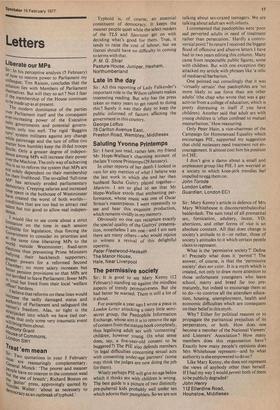Liberate our MPs
ecilleague, Tim Raison, concludes that the solution lies with Members of Parliament themselves. But will they so act ? Not I fear ever-increasing power of the Executive
e,emocracy. Creeping salaries and increased c.enditions that are too bad to attract real Sir: In his perceptive analysis (5 February) ef how to restore power to Parliament my if the membership of the House continues to be made up as at present.
Over Parliament itself and the consequent suits ments Only too well. The rigid 'Buggins turn' system militates against any change While patronage and the lure of office (no matter how humble) keep the ill-fed troops docile. Only a greater degree of independence among MPs will increase their power over the Machine. The only way of ach ieving this is so to reform the system that M Ps are not r ' solely dependent on their membership time sPent in the hothouse of Westminster have created the worst of both worldsdence.
talent but too good to allow real indepenor their livelihood. The so-called 'full-time The modern dominance of the parties has seriously eroded parliamentary
governments and potential govern. I would like to see come about a strict limitation on the time in each session available for legislation, thus forcing the `"°vernment to consider its priorities and at the same time liberating MPs to the World outside Westminster; fixed-term e b,,e,eitions thus preventing Prime Ministers 'ILYing their back bench supporters; gereater powers for a reformed Second ielarnber; no more salary increases but better Pension provisions so that MPs are et terrified to leave Parliament; fewer MPs 0„total but freed from their local 'welfare ,.,
"'neer' burdens.
I believe that reforms on these lines would illerkease the sadly damaged status and authority of Parliament and safeguard the nations freedom. Alas, so tight is the st
sertaitiacket into which we have tied our , that only some very traumatic event :111bring them about.
nnthcMY Grant Cuse of Commons, °rIcjon SW1


































 Previous page
Previous page